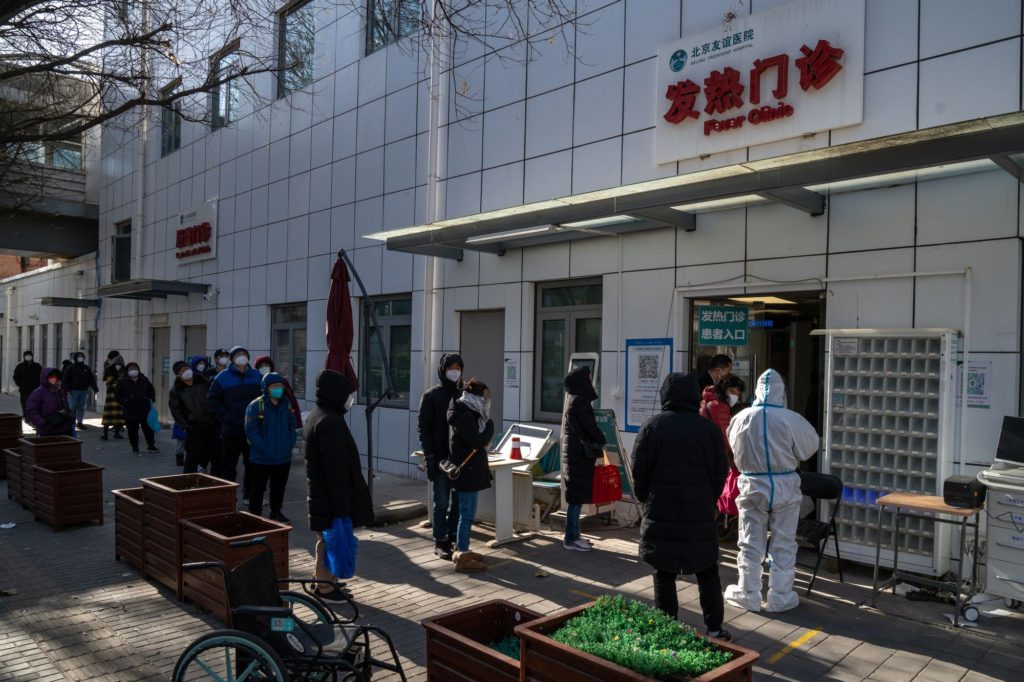China seems to be embracing a fast and explosive Covid reopening, a risky approach that’s worrying observers given the vast country’s vulnerabilities.
(Bloomberg) — China seems to be embracing a fast and explosive Covid reopening, a risky approach that’s worrying observers given the vast country’s vulnerabilities.
Since embarking on a landmark shift away from its zero-tolerance policy just a week ago, China has dismantled most of its internal restrictions, casting aside the stringent playbook used to eliminate the virus for the past three years.
The rapid reversal is resulting in an eruption of cases, particularly in Beijing where the once expansive PCR testing apparatus appears to have been abandoned. The spread is so significant it’s rendered official Covid statistics all but meaningless, and seen hospitals in the capital already overwhelmed.
“Logic doesn’t seem to apply here,” Bloomberg Intelligence’s chief pharmaceutical analyst Sam Fazeli said in a TV interview. China’s mindset since pivoting away from Covid Zero is “there’s not so much we can do, we’ve done the best we can. We’ve got the blueprint for what the West did and what happened, so let’s just let it rip – which is what I think is going on,” Fazeli said.
End of Covid Zero Risks Overwhelming China With Infections
The unexpected about-turn — most economists, and Bloomberg Economics, were expecting a gradual, controlled exit from Covid Zero — is raising alarm given China is in the midst of a cold winter, its elderly vaccination rate is still well below other countries and the country’s healthcare system is under-resourced.
It’s unclear whether China has had time to stockpile anti-virals and other contingencies needed to handle what top Covid adviser, Zhang Wenhong, called a “massive” looming outbreak.
China Braces for Massive Covid Outbreak on Fast Reopening
The rapid shift reflects people’s frustration at Covid Zero, said Steven Lynch, managing director of the British Chamber of Commerce in China.
Snap lockdowns, frequent mass testing and mandatory quarantine for all those exposed to Covid were hallmarks of the stringent approach, which worked during the initial wave in Wuhan, but became almost impossible to maintain as the virus became more contagious in 2022.
The tough measures weighed on the world’s second-largest economy and disrupted people’s lives, culminating in a remarkable weekend of protests across China’s major cities.
“I wasn’t expecting China’s exit strategy to be so rapid,” said Lynch. “I thought it would be a gradual process. But again, you know, this speaks to the outpouring of anger and anxiety that people have had around Zero Covid.”
Milder Strain
While it’s difficult to gain insight into Chinese government decision-making, President Xi Jinping may have calculated that the current Covid strain in circulation is mild enough to risk a rapid lifting of controls, said Drew Thompson, visiting senior research fellow at the Lee Kuan Yew School of Public Policy at the National University of Singapore.
The pandemic has forced governments around the world to draw on different policymaking frameworks, and China is no exception, said Richard McGregor, senior fellow for East Asia at the Lowy Institute in Sydney.
“China doesn’t usually make such abrupt about turns – they usually stress test new policies in local experiments before rolling them out nationally,” he said. “The government now seems to have finally been convinced that the old approach was leading to disaster. The protests were important but I think the pivotal issue is the tanking economy.”
New Year Risk
Economists have had to quickly revise their forecasts for how China’s reopening may play out, as curbs fell away and cases surged.
China is now on track to be free of Covid restrictions by the end of March, Bloomberg Economics chief Asia economist Chang Shu wrote in a note Wednesday. That’s three months ahead of her earlier estimate, which presumed a more controlled exit.
Still, major uncertainties remain, including the Lunar New Year holiday in late January. Often dubbed the world’s biggest temporary migration, it’s the most significant travel period of the year in China. It risks becoming a super-spreader event that drives up the death toll and overwhelms the healthcare system, Chang said.
The abrupt policy change could also erode public confidence and give rise to misinformation and conspiracy theories, said Jeremy Lim, an adjunct associate professor at the National University of Singapore’s Saw Swee Hock School of Public Health.
“In general, a clear plan to transition from Zero Covid to living with Covid, including milestones, rough timelines and how resources will be deployed would have been very helpful to share publicly in advance,” said Lim. “Policies may change overnight but people do need time to come to terms with new situations and change their behaviors.”
–With assistance from Zibang Xiao.
(Updates with Lowy Institute analyst from 12th paragraph.)
More stories like this are available on bloomberg.com
©2022 Bloomberg L.P.










